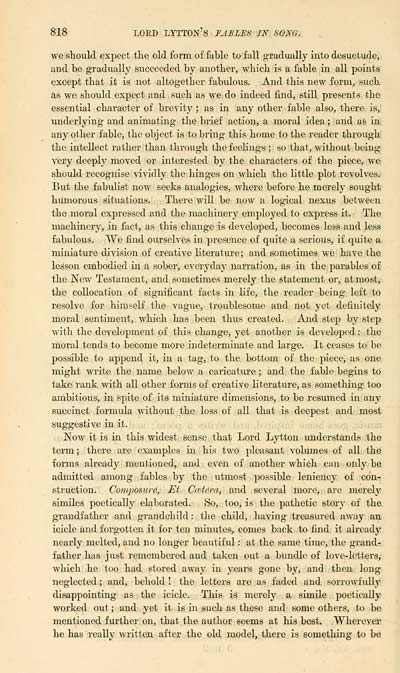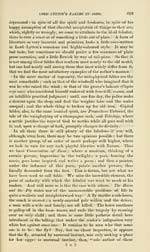Non-Fiction > Uncollected essays > Volume 15, 1874 - Fortnightly review
(14) Page 818
Download files
Complete book:
Individual page:
Thumbnail gallery: Grid view | List view

818 LORD lytton's fables in song.
we should expect the old form of fable to fall gradually into desuetude,
and be gradually succeeded by another, which is a fable in all points
except that it is not altogether fabulous. And this new form, such
as we should expect and such as we do indeed find, still presents the
essential character of brevity ; as in any other fable also, there is,
underlying and animating the brief action, a moral idea ; and as in
any other fable, the object is to bring this home to the reader through
the intellect rather than through the feelings ; so that, without being-
very deeply moved or interested by the characters of the piece, we
should recognise vividly the hinges on which the little plot revolves.
But the fabulist now seeks analogies, where before he merely sought
humorous situations. There will be now a logical nexus between
the moral expressed and the machinery employed to express it. The
machinery, in foot, as this change is developed, becomes less and less
fabulous. We find ourselves in presence of quite a serious, if quite a
miniature division of creative literature; and sometimes we have the
lesson embodied in a sober, everyday narration, as in the parables of
the New Testament, and sometimes merely the statement or, at most,
the collocation of significant facts in life, the reader being left to
resolve for himself the vague, troublesome and not yet definitely
moral sentiment, which has been thus created. And step by step
with the development of this change, yet another is developed : the
moral tends to become more indeterminate and large. It ceases to be
possible to append it, in a tag, to the bottom of the piece, as one
might write the name below a caricature ; and the fable begins to
take rank with all other forms of creative literature, as something too
ambitious, in sj)ite of its miniature dimensions, to be resumed in any
succinct formula without the loss of all that is deepest and most
suggestive in it.
Now it is in this widest sense that Lord Lytton understands the
term ; there are examples in his two pleasant volumes of all the
forms already mentioned, and even of another which can only be
admitted among fables by the utmost possible leniency of con-
struction. Composure, Et C(etem, and several more, are merely
similes poetically elaborated. So, too, is the pathetic story of the
grandfather and grandchild : the child, having treasured away an
icicle and forgotten it for ten minutes, comes back to find it already
nearly melted, and no longer beautiful : at the same time, the grand-
father has just remembered and taken out a bundle of love-letters,
which he too had stored away in years gone by, and then long
neglected ; and, behold ! the letters are as faded and sorrowf idly
disappointing as the icicle. This is merely a simile poetically
worked out ; and yet it is in such as these and some others, to be
mentioned further on, that the author seems at his best. Wherever
he has really written after the old model, there is something to be
we should expect the old form of fable to fall gradually into desuetude,
and be gradually succeeded by another, which is a fable in all points
except that it is not altogether fabulous. And this new form, such
as we should expect and such as we do indeed find, still presents the
essential character of brevity ; as in any other fable also, there is,
underlying and animating the brief action, a moral idea ; and as in
any other fable, the object is to bring this home to the reader through
the intellect rather than through the feelings ; so that, without being-
very deeply moved or interested by the characters of the piece, we
should recognise vividly the hinges on which the little plot revolves.
But the fabulist now seeks analogies, where before he merely sought
humorous situations. There will be now a logical nexus between
the moral expressed and the machinery employed to express it. The
machinery, in foot, as this change is developed, becomes less and less
fabulous. We find ourselves in presence of quite a serious, if quite a
miniature division of creative literature; and sometimes we have the
lesson embodied in a sober, everyday narration, as in the parables of
the New Testament, and sometimes merely the statement or, at most,
the collocation of significant facts in life, the reader being left to
resolve for himself the vague, troublesome and not yet definitely
moral sentiment, which has been thus created. And step by step
with the development of this change, yet another is developed : the
moral tends to become more indeterminate and large. It ceases to be
possible to append it, in a tag, to the bottom of the piece, as one
might write the name below a caricature ; and the fable begins to
take rank with all other forms of creative literature, as something too
ambitious, in sj)ite of its miniature dimensions, to be resumed in any
succinct formula without the loss of all that is deepest and most
suggestive in it.
Now it is in this widest sense that Lord Lytton understands the
term ; there are examples in his two pleasant volumes of all the
forms already mentioned, and even of another which can only be
admitted among fables by the utmost possible leniency of con-
struction. Composure, Et C(etem, and several more, are merely
similes poetically elaborated. So, too, is the pathetic story of the
grandfather and grandchild : the child, having treasured away an
icicle and forgotten it for ten minutes, comes back to find it already
nearly melted, and no longer beautiful : at the same time, the grand-
father has just remembered and taken out a bundle of love-letters,
which he too had stored away in years gone by, and then long
neglected ; and, behold ! the letters are as faded and sorrowf idly
disappointing as the icicle. This is merely a simile poetically
worked out ; and yet it is in such as these and some others, to be
mentioned further on, that the author seems at his best. Wherever
he has really written after the old model, there is something to be
Set display mode to: Large image | Transcription
Images and transcriptions on this page, including medium image downloads, may be used under the Creative Commons Attribution 4.0 International Licence unless otherwise stated. ![]()
| Early editions of Robert Louis Stevenson > Non-Fiction > Uncollected essays > Fortnightly review > (14) Page 818 |
|---|
| Permanent URL | https://digital.nls.uk/79231509 |
|---|
| Form / genre: |
Written and printed matter > Periodicals |
|---|---|
| Dates / events: |
1874 [Date published] |
| Places: |
Europe >
United Kingdom >
England >
Greater London >
London
(inhabited place) [Place published] |
| Subject / content: |
Reviews (document genre) |
| Person / organisation: |
Stevenson, Robert Louis, 1850-1894 [Contributor] Chapman and Hall [Publisher] Morley, John, 1838-1923 [Editor] |
| Description | Essays and reviews from contemporary magazines and journals (some of which are republished in the collections). 'Will o' the Mill', from Volume 37 of the 'Cornhill Magazine', is a short story or fable. |
|---|
| Person / organisation: |
Stevenson, Robert Louis, 1850-1894 [Author] |
|---|


![[Page 817]Lord Lytton's 'Fables in song'](https://deriv.nls.uk/dcn4/7923/79231499.4.jpg)
